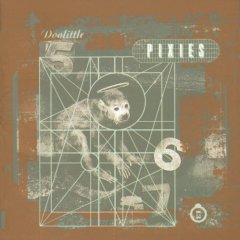 This is where I got well and truly on board with the Pixies' grand experiment in sound and rhythm. In retrospect, I think the friction between Black Francis and Mrs. John Murphy, here on the verge of boiling over into caustic and permanent damage to the band, probably made them better—certainly their ensuing solo and elsewise wandering afield careers show that the Pixies are vastly more than the sum of their parts, and it's a shame that everything after this was inferior to what came before. (Although, n.b., everything with the Pixies name attached is worthwhile and then some.) This is my favorite, and to put a point on it, I think "Monkey Gone to Heaven" is where everything comes together in a glorious and eternal 2:56 that stands up to repeated play and endless analysis, stoned or otherwise. Consider the deceptively nonsense lyrics of the final verse and chorus (aka "searing climax"): "if man is 5 (3x) / then the devil is 6 (5x) / then god is 7 (3x) / this monkey's gone to heaven." You can't overthink this, it just keeps deepening and deepening into itself, with man represented by the digits of one hand, the devil by the ancient lore of the number 6 (particularly when 3x, of course, but here presented 5x, effectively echoing the number of man), god by the same, viz., the number 7 (rhymes with heaven), in symmetrical relation 3x to man, underlined by a host of unholy shrieking. Then the monkey appears. The strings throughout are very nice too. This is amazing stuff.
This is where I got well and truly on board with the Pixies' grand experiment in sound and rhythm. In retrospect, I think the friction between Black Francis and Mrs. John Murphy, here on the verge of boiling over into caustic and permanent damage to the band, probably made them better—certainly their ensuing solo and elsewise wandering afield careers show that the Pixies are vastly more than the sum of their parts, and it's a shame that everything after this was inferior to what came before. (Although, n.b., everything with the Pixies name attached is worthwhile and then some.) This is my favorite, and to put a point on it, I think "Monkey Gone to Heaven" is where everything comes together in a glorious and eternal 2:56 that stands up to repeated play and endless analysis, stoned or otherwise. Consider the deceptively nonsense lyrics of the final verse and chorus (aka "searing climax"): "if man is 5 (3x) / then the devil is 6 (5x) / then god is 7 (3x) / this monkey's gone to heaven." You can't overthink this, it just keeps deepening and deepening into itself, with man represented by the digits of one hand, the devil by the ancient lore of the number 6 (particularly when 3x, of course, but here presented 5x, effectively echoing the number of man), god by the same, viz., the number 7 (rhymes with heaven), in symmetrical relation 3x to man, underlined by a host of unholy shrieking. Then the monkey appears. The strings throughout are very nice too. This is amazing stuff.
Thursday, November 22, 2007
Doolittle (1989)
 This is where I got well and truly on board with the Pixies' grand experiment in sound and rhythm. In retrospect, I think the friction between Black Francis and Mrs. John Murphy, here on the verge of boiling over into caustic and permanent damage to the band, probably made them better—certainly their ensuing solo and elsewise wandering afield careers show that the Pixies are vastly more than the sum of their parts, and it's a shame that everything after this was inferior to what came before. (Although, n.b., everything with the Pixies name attached is worthwhile and then some.) This is my favorite, and to put a point on it, I think "Monkey Gone to Heaven" is where everything comes together in a glorious and eternal 2:56 that stands up to repeated play and endless analysis, stoned or otherwise. Consider the deceptively nonsense lyrics of the final verse and chorus (aka "searing climax"): "if man is 5 (3x) / then the devil is 6 (5x) / then god is 7 (3x) / this monkey's gone to heaven." You can't overthink this, it just keeps deepening and deepening into itself, with man represented by the digits of one hand, the devil by the ancient lore of the number 6 (particularly when 3x, of course, but here presented 5x, effectively echoing the number of man), god by the same, viz., the number 7 (rhymes with heaven), in symmetrical relation 3x to man, underlined by a host of unholy shrieking. Then the monkey appears. The strings throughout are very nice too. This is amazing stuff.
This is where I got well and truly on board with the Pixies' grand experiment in sound and rhythm. In retrospect, I think the friction between Black Francis and Mrs. John Murphy, here on the verge of boiling over into caustic and permanent damage to the band, probably made them better—certainly their ensuing solo and elsewise wandering afield careers show that the Pixies are vastly more than the sum of their parts, and it's a shame that everything after this was inferior to what came before. (Although, n.b., everything with the Pixies name attached is worthwhile and then some.) This is my favorite, and to put a point on it, I think "Monkey Gone to Heaven" is where everything comes together in a glorious and eternal 2:56 that stands up to repeated play and endless analysis, stoned or otherwise. Consider the deceptively nonsense lyrics of the final verse and chorus (aka "searing climax"): "if man is 5 (3x) / then the devil is 6 (5x) / then god is 7 (3x) / this monkey's gone to heaven." You can't overthink this, it just keeps deepening and deepening into itself, with man represented by the digits of one hand, the devil by the ancient lore of the number 6 (particularly when 3x, of course, but here presented 5x, effectively echoing the number of man), god by the same, viz., the number 7 (rhymes with heaven), in symmetrical relation 3x to man, underlined by a host of unholy shrieking. Then the monkey appears. The strings throughout are very nice too. This is amazing stuff.
Tuesday, November 20, 2007
Surfer Rosa (1988)
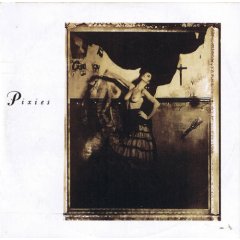 Enter Steve Albini, neither here nor there I suppose, but whose trademark brittle/sludgy mix with the drumkit persistently pushed to dominate all proceedings happened to make a neat fit with the Pixies, slipping into itself just as if it, the band, always belonged there, here, in this wild and gorgeous place. Because it did. The Pixies came from nowhere. Eventually they would hurtle back there. In between time, they made world-beating music like few others in or out of their time. They take it all the way down to a throbbing bass string and kick drum and Kim Deal's quavery vocal and all the way up to a wall of sound that tears apart your world and down again to Black Francis mumbling this or that ("where is my mind? where is my mind? where is my mind?") with a sour fuzzy guitar twang tracing him and then back up again to him shrieking and shrieking against the dense, pulsing, penetrable concretion. And the ghosts, haunting it all, the dogs barking and howling. The whole thing is practically organic. It worked in the studio, it worked on stage. It just plain worked. This is a first album? Enjoy it while you can because it's not going to last forever.
Enter Steve Albini, neither here nor there I suppose, but whose trademark brittle/sludgy mix with the drumkit persistently pushed to dominate all proceedings happened to make a neat fit with the Pixies, slipping into itself just as if it, the band, always belonged there, here, in this wild and gorgeous place. Because it did. The Pixies came from nowhere. Eventually they would hurtle back there. In between time, they made world-beating music like few others in or out of their time. They take it all the way down to a throbbing bass string and kick drum and Kim Deal's quavery vocal and all the way up to a wall of sound that tears apart your world and down again to Black Francis mumbling this or that ("where is my mind? where is my mind? where is my mind?") with a sour fuzzy guitar twang tracing him and then back up again to him shrieking and shrieking against the dense, pulsing, penetrable concretion. And the ghosts, haunting it all, the dogs barking and howling. The whole thing is practically organic. It worked in the studio, it worked on stage. It just plain worked. This is a first album? Enjoy it while you can because it's not going to last forever.
Sunday, November 18, 2007
Come On Pilgrim (1987)
 Damn fine debut EP from a band, the Pixies, that single-handedly refined and redirected "alternative" rock, doing everything but ridding of it the stupid label. Here's what we know: Black Francis (aka Frank Black, Charles Thompson IV) teams with Mrs. John Murphy (aka Kim Deal) to form a 2 guitars-bass-drums outfit. Most of their songs are short and feature a lot of caterwauling from the two principles, some of it in Spanish. The verses are often quiet, the choruses loud. When I say loud, I mean LOUD. As in deafening. The tunes are pretty good. The lyrics don't make much sense. The band is what's known as tight. Stand by for the next chapter in rock 'n' roll history.
Damn fine debut EP from a band, the Pixies, that single-handedly refined and redirected "alternative" rock, doing everything but ridding of it the stupid label. Here's what we know: Black Francis (aka Frank Black, Charles Thompson IV) teams with Mrs. John Murphy (aka Kim Deal) to form a 2 guitars-bass-drums outfit. Most of their songs are short and feature a lot of caterwauling from the two principles, some of it in Spanish. The verses are often quiet, the choruses loud. When I say loud, I mean LOUD. As in deafening. The tunes are pretty good. The lyrics don't make much sense. The band is what's known as tight. Stand by for the next chapter in rock 'n' roll history.
Remembering Satan: A Tragic Case of Recovered Memory (1994)
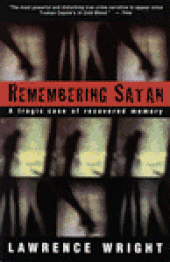 Fascinating true crime case from New Yorker writer Lawrence Wright—one of those vaguely creepy miscarriages of justice along the lines of what's seen in the documentary, Capturing the Friedmans, where it gets hard figuring out the good guys from the bad, and there's an undertowing urge to wish you'd never heard about any of it. In this book, Wright details the story of Olympia, Washington, sheriff's deputy and fundamentalist Christian Paul Ingram, whose teen daughters, on the basis of so-called recovered memories, accused him in 1988 of involvement with a Satanic cult, which physically and sexually abused them in ritual fashion. Their stories are unbelievably horrific—dismembered babies, gallons of blood, revolting sex, lots of chanting and finger cymbals. Not surprisingly, almost no physical or corroborative evidence supports their claims. Bizarrely, upon being arrested Ingram furrows his brow and starts recovering memories of his own. Near or shortly after the trial he finally came to his senses (as I read it) and recanted all. But too late. In the end he went to prison for well over a decade. The daughters have evidently never wavered. Those choosing to believe them over the father account for the lack of evidence Napoleon Dynamite style: "IDIOT! It's Satan. Of course he's going to get rid of the evidence." There's a cautionary tale in here somewhere.
Fascinating true crime case from New Yorker writer Lawrence Wright—one of those vaguely creepy miscarriages of justice along the lines of what's seen in the documentary, Capturing the Friedmans, where it gets hard figuring out the good guys from the bad, and there's an undertowing urge to wish you'd never heard about any of it. In this book, Wright details the story of Olympia, Washington, sheriff's deputy and fundamentalist Christian Paul Ingram, whose teen daughters, on the basis of so-called recovered memories, accused him in 1988 of involvement with a Satanic cult, which physically and sexually abused them in ritual fashion. Their stories are unbelievably horrific—dismembered babies, gallons of blood, revolting sex, lots of chanting and finger cymbals. Not surprisingly, almost no physical or corroborative evidence supports their claims. Bizarrely, upon being arrested Ingram furrows his brow and starts recovering memories of his own. Near or shortly after the trial he finally came to his senses (as I read it) and recanted all. But too late. In the end he went to prison for well over a decade. The daughters have evidently never wavered. Those choosing to believe them over the father account for the lack of evidence Napoleon Dynamite style: "IDIOT! It's Satan. Of course he's going to get rid of the evidence." There's a cautionary tale in here somewhere.In case it's not at the library
Thursday, November 15, 2007
Goo (1990)
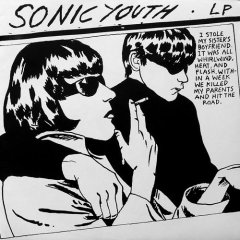 The much anticipated (and/or dreaded, depending on your point of view) major-label debut follow-up to Daydream Nation entered a worthy placeholder in the band's career. Obviously there was never going to be any corporate compromise/sellout going on here—there could not possibly be, given all that Thurston Moore & crew had at stake. Just as obviously, if only in hindsight, it was never going to be a match for the album before it. Not much could be. Disappointment, pleasure, relief—that was all in the eye of the beholder. I think it's pretty good. Spotty, maybe. But the sheets of noise are there. The melodies are still improving. The occasional jokes sharpening. It was brave enough given major-label expectations on all sides. And it still sounds pretty good. How many albums from 1990 can you say that about?
The much anticipated (and/or dreaded, depending on your point of view) major-label debut follow-up to Daydream Nation entered a worthy placeholder in the band's career. Obviously there was never going to be any corporate compromise/sellout going on here—there could not possibly be, given all that Thurston Moore & crew had at stake. Just as obviously, if only in hindsight, it was never going to be a match for the album before it. Not much could be. Disappointment, pleasure, relief—that was all in the eye of the beholder. I think it's pretty good. Spotty, maybe. But the sheets of noise are there. The melodies are still improving. The occasional jokes sharpening. It was brave enough given major-label expectations on all sides. And it still sounds pretty good. How many albums from 1990 can you say that about?
POTQ: Part of the Queue... Pocos días para la gran sorpresa!!!
Here's a music blog with all the right elements: frequent updates, interesting threads, variety, albums you want (don't miss the Imprescindibles series, which includes Serge Gainsbourg, DEVO, Transformer, Gorillaz, Manic Street Preachers, Janis Joplin, Cardigans, and Horses, and that's just recently), and an opportunity to practice new language skills. Goce!
See more great music blogs.
Tuesday, November 13, 2007
Daydream Nation (1988)
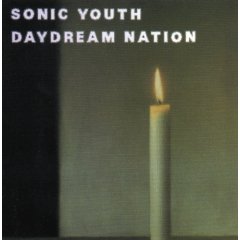 The best album that Sonic Youth ever made, one of the best albums of its time, kind of sneaked up on a lot of us—me, I know, for sure. They were an interesting sideshow, Thurston Moore with his big mouth and all that howling noise they brought and the strange tunings. Strictly small stage indie world. But then this, the bold double album with gatefold, and with that somnolent candle, carrying the kind of sounds that sink deep and somehow pack spiritual significance on the way. You can listen to this—loud, on headphones, for example, walking around the city at night—and after awhile the boundaries blur and you don't know where you end and the music begins or the dark and the sheets of noise and the pure physical sensation of it and your own breathing. They were starting to write songs, with melody even lyrics, but that's not what makes this work. That's something else, but suddenly the whole world unfolded open and the possibilities went all the way to the red horizon and beyond. Essential. That's what I'm trying to say.
The best album that Sonic Youth ever made, one of the best albums of its time, kind of sneaked up on a lot of us—me, I know, for sure. They were an interesting sideshow, Thurston Moore with his big mouth and all that howling noise they brought and the strange tunings. Strictly small stage indie world. But then this, the bold double album with gatefold, and with that somnolent candle, carrying the kind of sounds that sink deep and somehow pack spiritual significance on the way. You can listen to this—loud, on headphones, for example, walking around the city at night—and after awhile the boundaries blur and you don't know where you end and the music begins or the dark and the sheets of noise and the pure physical sensation of it and your own breathing. They were starting to write songs, with melody even lyrics, but that's not what makes this work. That's something else, but suddenly the whole world unfolded open and the possibilities went all the way to the red horizon and beyond. Essential. That's what I'm trying to say.
Sunday, November 11, 2007
The Innocent (1989)
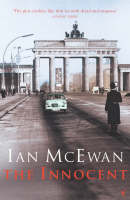 Ian McEwan's deceptively straightforward novel of love and intrigue in 1950s Cold War Berlin brilliantly drops chunks and slices of various genres into the blender and purees. As romance, its core, it's most effective, although that may be because its turn to horror is so surprising, unsettling, and ferociously unrelenting that the shock leaves one softened for human qualities—indeed, pathetically yearning for them. The appurtenances of spy novel, and rock 'n' roll coming of age tale, are there purely for the decoration, or the blessed distraction. Maybe because they're both Brits playing along the borders of cruelty and sexuality, McEwan here reminds me some of John Fowles. But underneath all the crisp pluck and cheeky diffidence, I get the sense there's more of a heart here than in anything from Fowles, and honestly, I don't have a single excuse for why I don't know more about McEwan's much more celebrated work. I'll have to get on that right away.
Ian McEwan's deceptively straightforward novel of love and intrigue in 1950s Cold War Berlin brilliantly drops chunks and slices of various genres into the blender and purees. As romance, its core, it's most effective, although that may be because its turn to horror is so surprising, unsettling, and ferociously unrelenting that the shock leaves one softened for human qualities—indeed, pathetically yearning for them. The appurtenances of spy novel, and rock 'n' roll coming of age tale, are there purely for the decoration, or the blessed distraction. Maybe because they're both Brits playing along the borders of cruelty and sexuality, McEwan here reminds me some of John Fowles. But underneath all the crisp pluck and cheeky diffidence, I get the sense there's more of a heart here than in anything from Fowles, and honestly, I don't have a single excuse for why I don't know more about McEwan's much more celebrated work. I'll have to get on that right away.In case it's not at the library.
Saturday, November 10, 2007
The Unboxed Set (1980-1988)
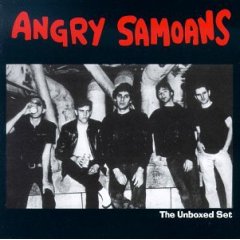 It's possible that the Angry Samoans are an acquired taste. But I wouldn't know about that. I liked them from the first time I saw them along about 1983 on an old episode of the USA Network's "Night Flight," razzing Peter Ivers unmercifully just before exploding into such fare as "Steak Knife" and "Todd Killings" (about murderer Skipper Todd: "He's killing time, Todd killings!"), all elbows and knees and grimacing blasts of sound. Shortly after that Peter Ivers was murdered, but I'm pretty sure that was just a coincidence. Maybe it's that I'm naturally partial to rock critic bands—I also like the Pet Shop Boys and Pretenders. The AS are very funny, mocking all the usual stuff (mediocrity, conformity, narrow-mindedness, etc., etc.), while celebrating all the usual stuff (psychotronic movies, their own natural yet criminally overlooked superiority, so on and so forth), all of it in ways that skate dangerously, disturbingly close to bad taste and worse. For example, do they hate homosexuals or do they hate homophobes? It's a pretty close call but I have to go with the latter, if only because that's what I want to believe. As ever, YMMV.
It's possible that the Angry Samoans are an acquired taste. But I wouldn't know about that. I liked them from the first time I saw them along about 1983 on an old episode of the USA Network's "Night Flight," razzing Peter Ivers unmercifully just before exploding into such fare as "Steak Knife" and "Todd Killings" (about murderer Skipper Todd: "He's killing time, Todd killings!"), all elbows and knees and grimacing blasts of sound. Shortly after that Peter Ivers was murdered, but I'm pretty sure that was just a coincidence. Maybe it's that I'm naturally partial to rock critic bands—I also like the Pet Shop Boys and Pretenders. The AS are very funny, mocking all the usual stuff (mediocrity, conformity, narrow-mindedness, etc., etc.), while celebrating all the usual stuff (psychotronic movies, their own natural yet criminally overlooked superiority, so on and so forth), all of it in ways that skate dangerously, disturbingly close to bad taste and worse. For example, do they hate homosexuals or do they hate homophobes? It's a pretty close call but I have to go with the latter, if only because that's what I want to believe. As ever, YMMV.
Wednesday, November 07, 2007
Hungry for Stink (1994)
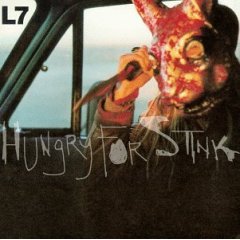 L7 calls this rut a groove and goes with it. The only difference from its immediate predecessor, and kind of a shame into the bargain, is that the mix too often swallows the vocals. But then, the lyrics this time are several clicks of the dial darker: rage about to detonate, the vulnerable followed down dark streets, baggage that drowns, depression gone too far ("the paint chips are kicking in"), and TVs broadcasting personalized messages. "I'm good at feeling bad I'm even better at feeling worse." I suppose it's not really fare for the weak of spirit. But feel it: the punk is punker, the heavy is heavier, and the metal metaller. Don't miss the throbbing cellos on "Can I Run." Those wanting a straight jolt of rock 'n' roll are referred to "Riding With a Movie Star." Headbangers of all stripes, down your antidepressants and start your engines. This one goes all laps.
L7 calls this rut a groove and goes with it. The only difference from its immediate predecessor, and kind of a shame into the bargain, is that the mix too often swallows the vocals. But then, the lyrics this time are several clicks of the dial darker: rage about to detonate, the vulnerable followed down dark streets, baggage that drowns, depression gone too far ("the paint chips are kicking in"), and TVs broadcasting personalized messages. "I'm good at feeling bad I'm even better at feeling worse." I suppose it's not really fare for the weak of spirit. But feel it: the punk is punker, the heavy is heavier, and the metal metaller. Don't miss the throbbing cellos on "Can I Run." Those wanting a straight jolt of rock 'n' roll are referred to "Riding With a Movie Star." Headbangers of all stripes, down your antidepressants and start your engines. This one goes all laps.
Monday, November 05, 2007
Bricks Are Heavy (1992)
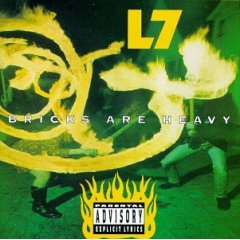 This is way better than you know, in case you've never heard it. These four gals from Los Angeles were pissed off plus along about the time of the first Iraq War (imagine how they feel now), possessed of all the requisite cool to translate that into music that thunders and breathes pure fire. Because it is so deft and accomplished at pulling together elements of metal (the big big bottom, the sparkling Eddie Van Halen guitar flourishes) with elements of punk (all attitude all the time), and also maybe because Butch Vig helms this one, the label most often applied is "grunge." Well, whatever. Every track here comes on like bulldozers, rife with nifty melody, groovy vocal interplay, sharp biting references, and hilarious lyrical strategies ("My diet pill is wearing off"). A total winner.
This is way better than you know, in case you've never heard it. These four gals from Los Angeles were pissed off plus along about the time of the first Iraq War (imagine how they feel now), possessed of all the requisite cool to translate that into music that thunders and breathes pure fire. Because it is so deft and accomplished at pulling together elements of metal (the big big bottom, the sparkling Eddie Van Halen guitar flourishes) with elements of punk (all attitude all the time), and also maybe because Butch Vig helms this one, the label most often applied is "grunge." Well, whatever. Every track here comes on like bulldozers, rife with nifty melody, groovy vocal interplay, sharp biting references, and hilarious lyrical strategies ("My diet pill is wearing off"). A total winner.
Sunday, November 04, 2007
Shot in the Heart (1994)
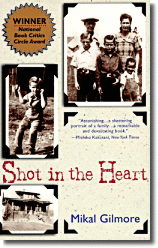 Mikal Gilmore you might know as one of the team of virtually interchangeable, somewhat oddly named rock critics who have toiled in and out of the vineyards of Rolling Stone since the '80s—contemporary with Parke Puterbaugh, J.D. Considine, David Fricke, Anthony De Curtis, Kurt Loder. Or you might know Mikal Gilmore as the youngest brother of Gary Gilmore, convicted and executed Utah murderer and star of Norman Mailer's impressive The Executioner's Song. In this riveting memoir, Mikal Gilmore tells the story of his family, his brother, and himself, simply, starkly, harrowingly, and without a shred of self-pity. To say it's remarkable does not come close to doing it justice. Without a doubt this is one of the best American memoirs ever written.
Mikal Gilmore you might know as one of the team of virtually interchangeable, somewhat oddly named rock critics who have toiled in and out of the vineyards of Rolling Stone since the '80s—contemporary with Parke Puterbaugh, J.D. Considine, David Fricke, Anthony De Curtis, Kurt Loder. Or you might know Mikal Gilmore as the youngest brother of Gary Gilmore, convicted and executed Utah murderer and star of Norman Mailer's impressive The Executioner's Song. In this riveting memoir, Mikal Gilmore tells the story of his family, his brother, and himself, simply, starkly, harrowingly, and without a shred of self-pity. To say it's remarkable does not come close to doing it justice. Without a doubt this is one of the best American memoirs ever written.In case it's not at the library.
Friday, November 02, 2007
Tupelo Honey (1971)
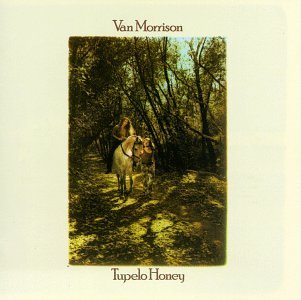 "You're My Woman" A more worthy follow-up to Moondance than the two immediately before and after this (His Band and the Street Choir and Saint Dominic's Preview), this one might also mark a point where agreements about Van Morrison begin to splinter. I think he's at his best when he sweetens the sauce and lets the music sparkle, holding the line on the longer workouts, which often—not always—drift toward self-indulgence (cf., "Listen to the Lion" on Dominic's). That's exactly what he's done here. Featuring career highwater marks in both "Wild Night" and "You're My Woman," nothing here is less than perfectly fine. The band boasts that Van Morrison specialty of playing both tight and loose all at once (how do they do that?), the tunes are exquisite, the chick singers fantastic, the harpsichord once again works, and the feeling throughout is warm, tender, and sweet. A good one.
"You're My Woman" A more worthy follow-up to Moondance than the two immediately before and after this (His Band and the Street Choir and Saint Dominic's Preview), this one might also mark a point where agreements about Van Morrison begin to splinter. I think he's at his best when he sweetens the sauce and lets the music sparkle, holding the line on the longer workouts, which often—not always—drift toward self-indulgence (cf., "Listen to the Lion" on Dominic's). That's exactly what he's done here. Featuring career highwater marks in both "Wild Night" and "You're My Woman," nothing here is less than perfectly fine. The band boasts that Van Morrison specialty of playing both tight and loose all at once (how do they do that?), the tunes are exquisite, the chick singers fantastic, the harpsichord once again works, and the feeling throughout is warm, tender, and sweet. A good one.Thursday, November 01, 2007
PunchDrunk
Proprietor Robert.Johnsson posts almost as sporadically to his blog as he does so generously, favoring discographies (or near discographies) of various punk and related artists: Mono Men, Ministry, Celibate Rifles, Imperiet, Ramones, Ed Kuepper, Saints, so on and so forth. Lots of great, handpicked individual titles as well. Understandably, he is annoyed and discouraged by trolls. But he works very hard at making this one of the most worthwhile of stops on your travels, continually taking time to re-up deleted titles and respond to requests. He deserves your support and kind words, and by the way, don't sign off as "Anonymous" when you do. Full albums available indefinitely. Archives worth browsing.
See more great music blogs.
Subscribe to:
Posts (Atom)
